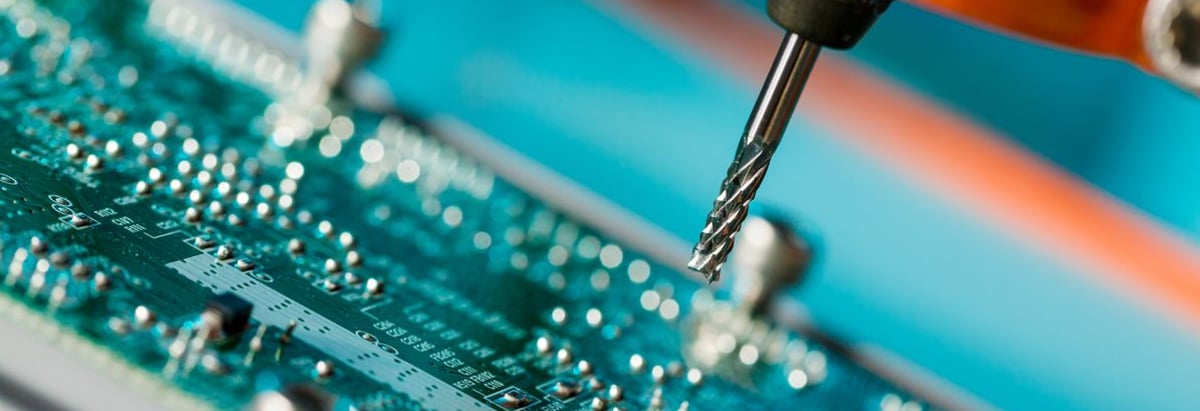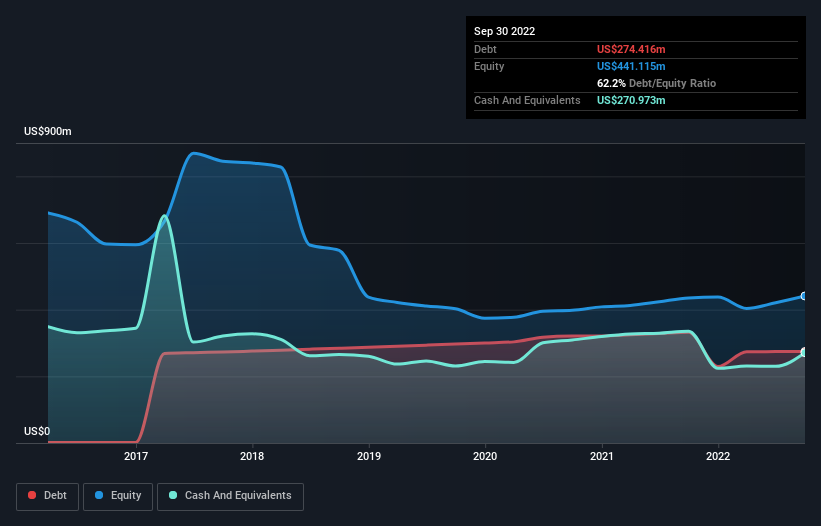
The external fund manager backed by Berkshire Hathaway's Charlie Munger, Li Lu, makes no bones about it when he says 'The biggest investment risk is not the volatility of prices, but whether you will suffer a permanent loss of capital.' When we think about how risky a company is, we always like to look at its use of debt, since debt overload can lead to ruin. Importantly, Veeco Instruments Inc. (NASDAQ:VECO) does carry debt. But should shareholders be worried about its use of debt?
When Is Debt A Problem?
Generally speaking, debt only becomes a real problem when a company can't easily pay it off, either by raising capital or with its own cash flow. If things get really bad, the lenders can take control of the business. However, a more common (but still painful) scenario is that it has to raise new equity capital at a low price, thus permanently diluting shareholders. Of course, plenty of companies use debt to fund growth, without any negative consequences. When we think about a company's use of debt, we first look at cash and debt together.
See our latest analysis for Veeco Instruments
What Is Veeco Instruments's Debt?
The image below, which you can click on for greater detail, shows that Veeco Instruments had debt of US$274.4m at the end of September 2022, a reduction from US$331.9m over a year. On the flip side, it has US$271.0m in cash leading to net debt of about US$3.44m.

A Look At Veeco Instruments' Liabilities
Zooming in on the latest balance sheet data, we can see that Veeco Instruments had liabilities of US$260.2m due within 12 months and liabilities of US$295.3m due beyond that. Offsetting these obligations, it had cash of US$271.0m as well as receivables valued at US$172.9m due within 12 months. So its liabilities outweigh the sum of its cash and (near-term) receivables by US$111.7m.
Since publicly traded Veeco Instruments shares are worth a total of US$1.12b, it seems unlikely that this level of liabilities would be a major threat. But there are sufficient liabilities that we would certainly recommend shareholders continue to monitor the balance sheet, going forward. Carrying virtually no net debt, Veeco Instruments has a very light debt load indeed.
We measure a company's debt load relative to its earnings power by looking at its net debt divided by its earnings before interest, tax, depreciation, and amortization (EBITDA) and by calculating how easily its earnings before interest and tax (EBIT) cover its interest expense (interest cover). The advantage of this approach is that we take into account both the absolute quantum of debt (with net debt to EBITDA) and the actual interest expenses associated with that debt (with its interest cover ratio).
Veeco Instruments's net debt to EBITDA ratio is very low, at 0.037, suggesting the debt is only trivial. Although with EBIT only covering interest expenses 4.9 times over, the company is truly paying for borrowing. Importantly, Veeco Instruments grew its EBIT by 33% over the last twelve months, and that growth will make it easier to handle its debt. The balance sheet is clearly the area to focus on when you are analysing debt. But it is future earnings, more than anything, that will determine Veeco Instruments's ability to maintain a healthy balance sheet going forward. So if you want to see what the professionals think, you might find this free report on analyst profit forecasts to be interesting.
But our final consideration is also important, because a company cannot pay debt with paper profits; it needs cold hard cash. So we clearly need to look at whether that EBIT is leading to corresponding free cash flow. Happily for any shareholders, Veeco Instruments actually produced more free cash flow than EBIT over the last three years. That sort of strong cash generation warms our hearts like a puppy in a bumblebee suit.
Our View
Veeco Instruments's conversion of EBIT to free cash flow suggests it can handle its debt as easily as Cristiano Ronaldo could score a goal against an under 14's goalkeeper. And the good news does not stop there, as its EBIT growth rate also supports that impression! Overall, we don't think Veeco Instruments is taking any bad risks, as its debt load seems modest. So the balance sheet looks pretty healthy, to us. Another factor that would give us confidence in Veeco Instruments would be if insiders have been buying shares: if you're conscious of that signal too, you can find out instantly by clicking this link.
When all is said and done, sometimes its easier to focus on companies that don't even need debt. Readers can access a list of growth stocks with zero net debt 100% free, right now.
New: Manage All Your Stock Portfolios in One Place
We've created the ultimate portfolio companion for stock investors, and it's free.
• Connect an unlimited number of Portfolios and see your total in one currency
• Be alerted to new Warning Signs or Risks via email or mobile
• Track the Fair Value of your stocks
Have feedback on this article? Concerned about the content? Get in touch with us directly. Alternatively, email editorial-team (at) simplywallst.com.
This article by Simply Wall St is general in nature. We provide commentary based on historical data and analyst forecasts only using an unbiased methodology and our articles are not intended to be financial advice. It does not constitute a recommendation to buy or sell any stock, and does not take account of your objectives, or your financial situation. We aim to bring you long-term focused analysis driven by fundamental data. Note that our analysis may not factor in the latest price-sensitive company announcements or qualitative material. Simply Wall St has no position in any stocks mentioned.
About NasdaqGS:VECO
Veeco Instruments
Develops, manufactures, sells, and supports semiconductor and thin film process equipment primarily to make electronic devices in the United States, Europe, the Middle East, and Africa, China, Rest of the Asia-Pacific, and internationally.
Flawless balance sheet with acceptable track record.
Similar Companies
Market Insights
Community Narratives




